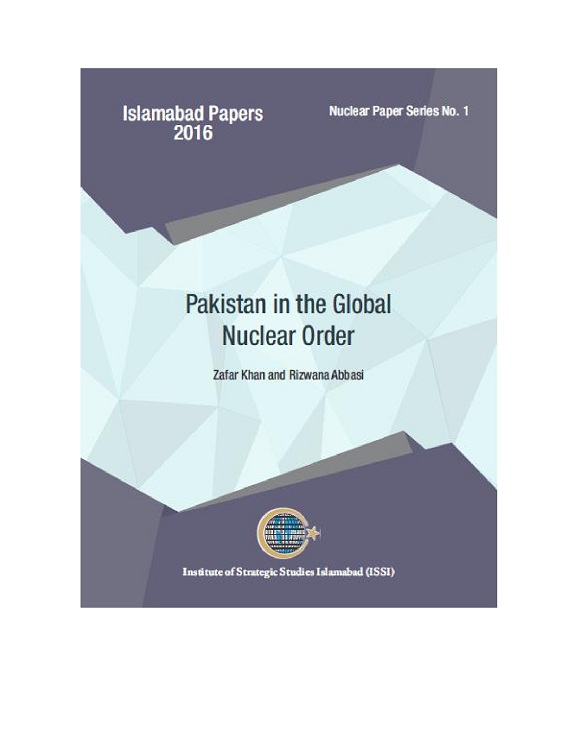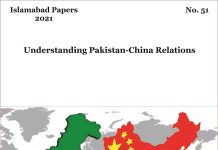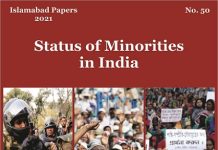Executive Summary
India introduced nuclear weapons in this region in 1974, compelling Pakistan to pursue a similar path. Indian nuclear explosions in 1998 forced Pakistan to develop a more elaborate nuclear force posture, doctrine and command and control system. Pakistan developed its nuclear weapons programme for defensive purposes only and to address its acute security concerns against India. Pakistan’s nuclear weapons programme is India-specific and it will continue to play a deterring role in the national security of Pakistan to defend itself by thwarting both major and limited wars in South Asia.
The introduction of Indian war-fighting strategy ─ the so-called Cold Start Doctrine (CSD) ─ purports to exploit the space for war under the nuclear overhang. India buttresses this strategy by building Ballistic Missile Defense (BMD) and rapidly developing a nuclear triad which includes fighter-bombers, Intercontinental Ballistic Missiles (ICBMs), and Submarine-Launched Ballistic Missiles (SLBMs). In response to the Indian war-fighting strategy, Pakistan has developed low-yield nuclear weapons alongwith short-range delivery vehicles such as Nasr (with the range of 60 kilometers) to deter a limited war. Arguably, India’s military Cold Start Doctrine appears to be offensive aimed at waging a limited war whilst Nasr is defensive to prevent India’s offensive strategy.
In parallel, Pakistan’s development of medium-range ballistic missile capability (Shaheen-3, 2750 kilometers) is to neutralize India’s second-strike capability from the Andaman and Nicobar Island bases. Pakistan says that it maintains a credible minimum deterrence; and that it neither seeks an arms race nor parity with India. Pakistan’s strategic policy is part of the perceived full spectrum deterrence, which remains consistent with broader contours of its credible minimum deterrence and is designed to deter all forms of aggression. The international community largely misperceives Pakistan’s declaratory statements on full spectrum deterrence by associating the concept with bigger numbers. Pakistan continues to pursue a policy of producing a smaller number of deterrent forces with no interest in pursuing a weapon to weapon equalization strategy. It aims to sustain balance rather than parity and does not want to be part of an unending arms race.
The international community should not overlook the gradually changing South Asian strategic environment influenced by India’s CSD, its development of non-strategic battlefield weapons, its preparation for hydrogen/ thermonuclear weapons, its strides towards an assured second-strike capability in the form of nuclear submarines, and its known and unknown nuclear facilities/reactor outside the International Atomic Energy Agency (IAEA) inspection, including a secret-city project in Karnataka.
The development of ICBMs, Multi-Independently Targetable Reentry Vehicles (MIRVs) and the BMD system has further accentuated strategic instability in South Asia. The changed strategic environment in South Asia puts greater pressure on Pakistan to upgrade and streamline its deterrent in order to sustain deterrence stability and avert a war.Domestically, Pakistan has commendably worked to improve its legal order, fight terrorism in its all forms and manifestations, create a rigorous export-control regime and construct a nuclear security regime. Regionally, it is ready to work on these parametres with other countries. Internationally, Pakistan adheres to the United Nations Security Council Resolution 1540 (2004). It is party to the Convention on Nuclear Safety, the Convention on the Physical Protection of Nuclear Material and Global Initiative to Combat Nuclear Terrorism, and the Container Security Initiative, and Incident and Trafficking Database. Moreover, Islamabad has established Pakistan’s Nuclear Regulatory Authority (PNRA) that closely works with the IAEA. Other important institutions such as Pakistan’s National Center of Excellence, Pakistan Institute of Engineering and Applied Sciences and the School for Nuclear and Radiation Safety provide world-class training and specialization in the field of nuclear security and radiation safety.
Domestically, Pakistan has commendably worked to improve its legal order, fight terrorism in its all forms and manifestations, create a rigorous export-control regime and construct a nuclear security regime. Regionally, it is ready to work on these parametres with other countries. Internationally, Pakistan adheres to the United Nations Security Council Resolution 1540 (2004). It is party to the Convention on Nuclear Safety, the Convention on the Physical Protection of Nuclear Material and Global Initiative to Combat Nuclear Terrorism, and the Container Security Initiative, and Incident and Trafficking Database. Moreover, Islamabad has established Pakistan’s Nuclear Regulatory Authority (PNRA) that closely works with the IAEA. Other important institutions such as Pakistan’s National Center of Excellence, Pakistan Institute of Engineering and Applied Sciences and the School for Nuclear and Radiation Safety provide world-class training and specialization in the field of nuclear security and radiation safety.
Pakistan has serious concerns in regard to the Indo-US nuclear deal and the US-backed Nuclear Suppliers Group (NSG) waiver for India. This volte-face in American policy, which has always championed non-proliferation, has undermined the non-proliferation regime and fuelled India’s defence modernization and expansion. Pakistan’s consistent diplomatic stance on the proposed Fissile Material Cut-off Treaty (FMCT) does not mean that Pakistan would necessarily increase its deterrent forces. Despite not being a part of the Non-Proliferation Treaty (NPT) and non-signatory to the Comprehensive Test Ban Treaty (CTBT), Pakistan unilaterally and voluntarily maintains a moratorium on nuclear testing, has a modest number of deterrent forces, follows credible minimum deterrence, keeps nuclear weapons for defensive purposes only and accepts the internationally verifiable, non-discriminatory and criteria-based non-proliferation endeavors.
Efforts should, therefore, be made to create an effective and enduring “criteria-based approach”for the non-NPT states to protect their right of peaceful uses of nuclear technology. Inclusion of Pakistan in the NSG through a revised criteria-based mechanism to preserve its right to peaceful uses of nuclear technology would strengthen, not weaken, the nuclear order.
This paper offers five proposals that seek a delicate balance in the competing interests amongst various parties in achieving strategic stability in South Asia and preserving each state’s right to peaceful uses of nuclear technology without expecting Pakistan to compromise its legitimate imperative of maintaining credible minimum deterrence. The proposals are: 1) normalizing the global nuclear order to make it consistent with emerging realities; 2) regulating India’s emerging nuclear modernization by addressing the growing conventional force asymmetry; 3) addressing the issues that hinder arms control in South Asia; 4) re-considering strategic dilemma affecting South Asia; and 5) resolving the issue of Jammu and Kashmir between India and Pakistan.The significance of these proposals is to assist international community in understanding Pakistan’s nuclear legitimacy and its consistent endeavours to join international nuclear mainstream to be part of the evolving global nuclear order as a responsible nuclear weapons state. All the
The significance of these proposals is to assist international community in understanding Pakistan’s nuclear legitimacy and its consistent endeavours to join international nuclear mainstream to be part of the evolving global nuclear order as a responsible nuclear weapons state. All the above mentioned recommendations are linked with the decisions of major states, mainly the US. Problems within the international nuclear order are not because of Pakistan. Major Powers’ double standards ─ application of more stringent rules towards one state and a lax approach towards other ─ have made the international nuclear order skewed. Trust and cooperation have been lacking due to non-fulfilment of the powerful states’ commitments to Article VI of the NPT. Pursuit of these proposals may help strengthen non-proliferation norms, promote peace, reduce the risk of nuclear weapons’ use in South Asia and support peaceful uses of nuclear technology. Also, it is important for India and Pakistan to rationalize their military plans under some budgetary regime and secure peace and stability in South Asia.















